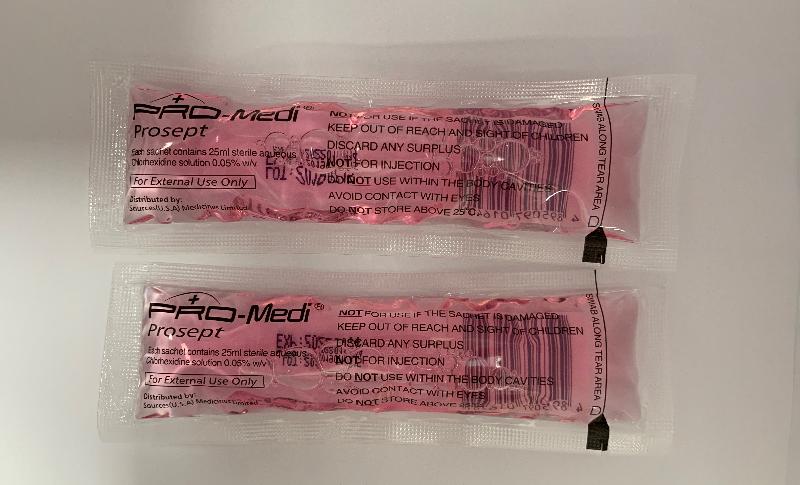Cluster of Burkholderia cepacia complex infection under DH investigation (with photo)
*************************************************************************************
The DH received notification from the Hospital Authority (HA) yesterday that the Queen Mary Hospital identified 53 peritoneal dialysis patients who had Burkholderia cepacia complex infection in the past two years. The affected persons involved 24 males and 29 females, aged 24 to 90. Among them, five cases were invasive infections.
According to the environmental surveillance by the HA, some samples of a type of prepacked aqueous chlorhexidine (see photo) acquired from shops in some hospitals, which is also available for sale in local shops and pharmacies, were found to have tested positive for Burkholderia cepacia complex. Prepacked aqueous chlorhexidine is used by peritoneal dialysis patients for skin disinfection and catheter exit site care at home.
Based on the HA's preliminary findings, the DH urges members of the public not to use the product named Pro-Medi Prosept solution for wound care because the product may be contaminated by bacteria.
The product is distributed by Sources (U.S.A.) Medicines Ltd (Sources). The DH has conducted an inspection at Sources today, during which samples of the product were collected for analytical tests. Sources voluntarily recalls the affected product from the market and has also set up a hotline (2411 3463) to answer related enquiries.
Pro-Medi Prosept solution contains 0.05 per cent chlorhexidine, which is not classified as a pharmaceutical product under the Pharmacy and Poisons Ordinance (Cap 138).
The DH has already contacted local private hospitals and registered renal dialysis centres to understand if they observed the emergence of Burkholderia cepacia complex infection among their patients. The DH will also contact the infected cases concerned, if any, for follow-up and investigation. In addition, the DH will issue a letter to inform doctors of the cases of infection, remind them not to use the product in question, and advise them on wound care.
The DH's epidemiological investigation and market surveillance operation on relevant products are still on-going.
"Members of the public, especially those who have weakened immune systems, such as renal patients, should pay extra attention to personal hygiene. Antiseptic products not indicated for wound care should not be used for that purpose or on broken skin. The public should also follow the instructions given by healthcare workers on wound care," a spokesman for the DH said.
"Burkholderia cepacia is a bacteria which is commonly found in water, soil, and moist environments. It is generally not pathogenic to healthy person but those who have weakened immune systems or chronic lung diseases may be more susceptible to infection with the bacteria," the spokesman explained.
Ends/Wednesday, September 18, 2019
Issued at HKT 19:45
Issued at HKT 19:45
NNNN





